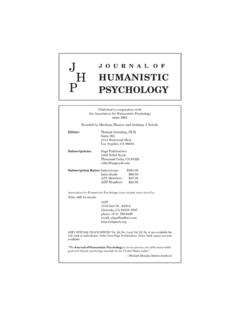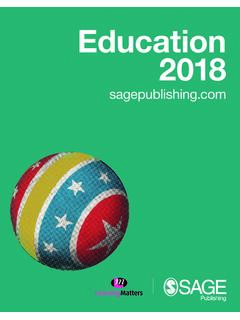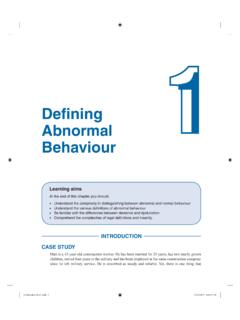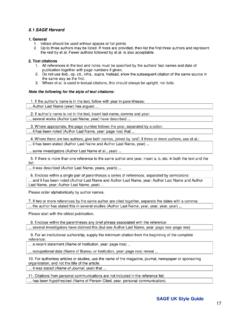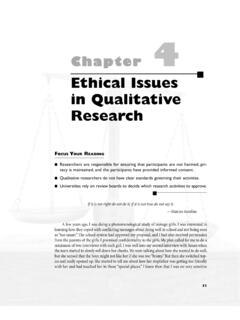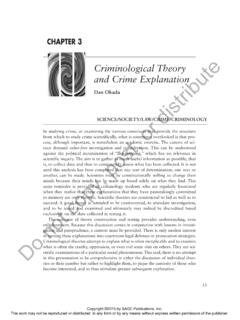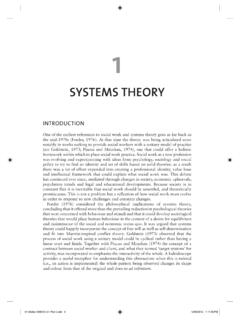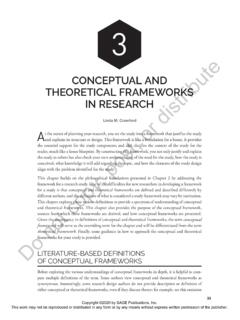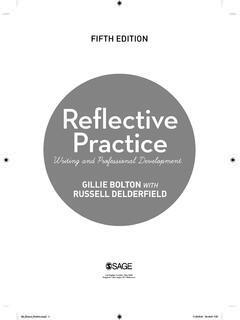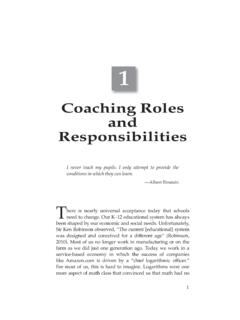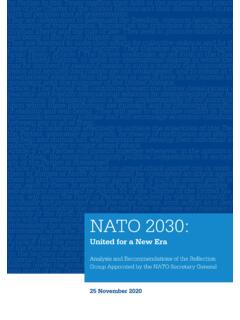Transcription of Chapter 1: Reflective Practice - SAGE Publications Ltd
1 Chapter 1: Reflective Practice In preparation for reading this Chapter , it is important to consider what you already know and what attitudes and belief systems you bring to the activity. To help you do this, the following questions are provided to focus your reflections . Q1. What is reflection? Q2. Who needs to reflect? Q3. Is it important for me? Q4. How does it help me? Q5. Do I think reflection is important for teachers? Why? Introduction Teaching is very demanding work. It requires a lot of energy, stamina and fortitude. Among all the physical activity however, it is important to remain focused on what may be identified as the more intellectual' aspects of the teaching profession. This is significant for several reasons. Arguably the most important of these is your obligation as a beginning teacher or an aspiring teacher to make increasingly well-informed decisions in the context of your everyday Practice .
2 This is because teaching is a profession in which demanding 1 17-Oct-13 5:57:13 PM. 2 Reflective Practice FOR TEACHERS. situations arise on a daily basis. Frequently there are no right or wrong answers, no procedures to follow, no time or opportunity to consult with supervising staff or colleagues. In some cases you may have the possibility of discussing with and receiving advice about incidents or concerns from appropriate others. Often, however, as a certified teacher (or even as a student teacher), you may simply be advised or expected to use your professional judgement. This may be a reasonable expectation, as it allows you to develop your skills in relation to decision making and problem solving in your specific educational context. However, it does assume that you are well-informed or have some experience of the Reflective process . It assumes that you have a framework within which to consider your options and determine any possible action .
3 Robins et al. (2003) describe Reflective Practice as a tool that allows teachers, student teachers and teaching assistants to understand themselves, their personal philosophies and the dynamics of their classroom more deeply. While acknowledging the critics who argue that there is little evidence that reflection actually changes behaviour, they propose that the process of engaging in reflection not only provides a personal resource that can be accessed in other similar contexts, but is also a tool that empowers individuals who use it. This is because engagement with the process of focused thinking supports self knowledge and understanding (White, 2004; Wieringa, 2011). The capacity to engage with your professional work in this manner is not always easy. One reason is that classrooms are busy, fast-moving work envi- ronments within which pupils of diverse characteristics are engaging in an extremely important undertaking: that of learning new knowledge, skills and strategies.
4 Another is that any framework or other tool to support your professional development is only as beneficial as the user is proficient. In order to develop the skills and competencies of an expert teacher, you need to engage in reflection. Reflective Practice , over time, allows you to become skilful in making informed judgements and professional decisions, and is empowering (Robins et al., 2003). Authentic engagement in reflection sup- ports your efforts to become contemplative, to improve your professional competencies and to identify your personal strengths and relative limitations as a teacher. It is because of its potential to impact positively on individual Practice that reflection is arguably the most important of the many profes- sional attributes that characterise successful teachers at every stage of their careers (White, 2004). What is Reflection? Reflection is very broadly able to be defined as the deliberate, purposeful, metacognitive thinking and/or action in which educators engage in order to improve their professional Practice .
5 Different theories, models and levels of 2 17-Oct-13 5:57:13 PM. Reflective Practice 3. reflection have most commonly focused on differentiating the major elements of this construct: the conditions, situations or circumstances that prompt engagement in the Reflective process the process itself, different types of reflection, different concepts or opinions on how this is undertaken the content of the reflection, what exactly needs to be analysed, examined, discussed, challenged in the Reflective process and with what perspectives or ideologies the product of the reflection, improved understanding of professional Practice , action taken as a result of the Reflective thinking. The brief overview of understandings of reflection in educational Practice that follows illustrates some of these differences as proposed by various writers in this field. What Does the Literature Say about Reflection? It is not possible to discuss all the writings about reflection, but a variety of ideas are presented here to provide some background for your own reading and research and to establish some common understanding of different ways of engaging with the Reflective process .
6 No introduction to reflection in education, however brief, would be pos- sible without discussing the early work of Dewey. His 1933 work How We Think is considered to be seminal in this area and was based on the ideas of a number of earlier philosophers and educators. Dewey's own definition of reflection as a cognitive process the active, persistent and careful considera- tion of any belief or supposed form of knowledge in the light of the grounds that support it and the further conclusions to which it tends' (1933: 9) indi- cates some of the basic characteristics that underpin almost all models and theories of reflection. However, he stresses the active, conscious, deliberate thinking in this particular type of problem solving. He also emphasises the rational, logical analysis of the problem, in which ideas are ordered and then linked together in a meaningful way. It was then intended that this chain' of thoughts was rigorously examined for any assumptions, underlying beliefs or knowledge that had been utilised in the formulating of a solution and any evidence that supported these ideas (Calderhead, 1989).
7 This process relies heavily on the use of scientific theory to guide teaching Practice and so the current and emerging scientific theories of that time are the predominant criteria in the evaluative processes of reflection. As a deliberate, reasoned, almost scientific activity, Dewey (1933) distinguished Reflective thinking from 3 17-Oct-13 5:57:13 PM. 4 Reflective Practice FOR TEACHERS. everyday, routine thinking and especially from impulsive thinking. Included in his notion of routine thinking was the thinking (and any subsequent actions) that resulted from an individual's automatic adherence to rules origi- nating from authority or from tradition. He proposed instead that action taken as a result of Reflective thinking was intelligent action ' (Calderhead, 1989: 44), because the aspects of the issue had been considered rationally and the practitioner had undergone periods of doubt and uncertainty while working towards finding a solution.
8 Dewey (1933) proposed that opportunities for Reflective thinking were prompted mainly by practical events that created feelings of disquiet or confusion or by a sense of wonder and awe. These were to be resolved by the persistent, reasoned thinking that he identified as reflection, and this thinking was to be guided by the goal in mind. Dewey's understanding of the role of reflection is that it is undertaken to develop the knowledge and expertise of teaching. Despite its importance and the heavy reliance of other theorists on his work, Dewey's notion on reflection has been challenged in several ways over the decades by other writers in this area. One of the most important critiques revolves around the notion that Dewey conceptualised reflection as the process of thinking about action and had not significantly linked it to action taken as the result of Reflective thinking, despite introducing the term Reflective action , which would complete what was identified as the reflec- tive cycle' (Gore and Zeichner, 1991; Noffke and Brennan, 1988), which most theorists understand to be the purpose of engaging in reflection.
9 Indeed, some writers ( Calderhead, 1989) are openly dismissive of reflec- tion that does not result in action . The very popular theory on reflection developed by Schon (1983, 1987, 1991) introduces some new ideas on the Reflective process itself, most especially on the implication in Dewey's (1933). theory that reflection is necessarily a process embarked on after the event, is a long, ponderous undertaking and also on the content of reflection itself. Schon (1983, 1987, 1991) suggests two levels of reflection: (i) reflection- in- action and (ii) reflection-on- action , partly based on Dewey's (1933). work. While Schon's (1983) theory differs in the criteria that constitute the content of reflection, in that he does not consider teaching to be the imple- mentation of scientific theory in the sense that Dewey (1933) theorised, he, and others who are inspired by Dewey's work to support Reflective teaching ( Cruickshank, 1985), do not offer any suggestions regarding what precisely in their Practice teachers do need to be Reflective about.
10 Reflection-on - action does have some of the same characteristics, specifically that the Reflective process is undertaken after the event, problem or situation that initiated the process . However, Schon (1983) offers an interesting departure from the perception that problems for reflection are necessarily reflected upon after the event. He suggests that reflection-in- action is a concept that 4 17-Oct-13 5:57:13 PM. Reflective Practice 5. celebrates the art of teaching, in that it allows for continual interpretation, investigation and Reflective conversation with oneself about the problem while employing the information gained from past experiences to inform and guide new actions. This process of experimentation, reflection and action combined, is cyclically conducted as the problem is continuously framed and reframed and as solu- tions to complex or ambiguous problems are systematically sought. This approach allows for contextually orientated experimentation in problem solv- ing; it is a way of using past experiences, reflection and action to experimen- tally problem solve on the spot' where the circumstances are confused or unclear.
